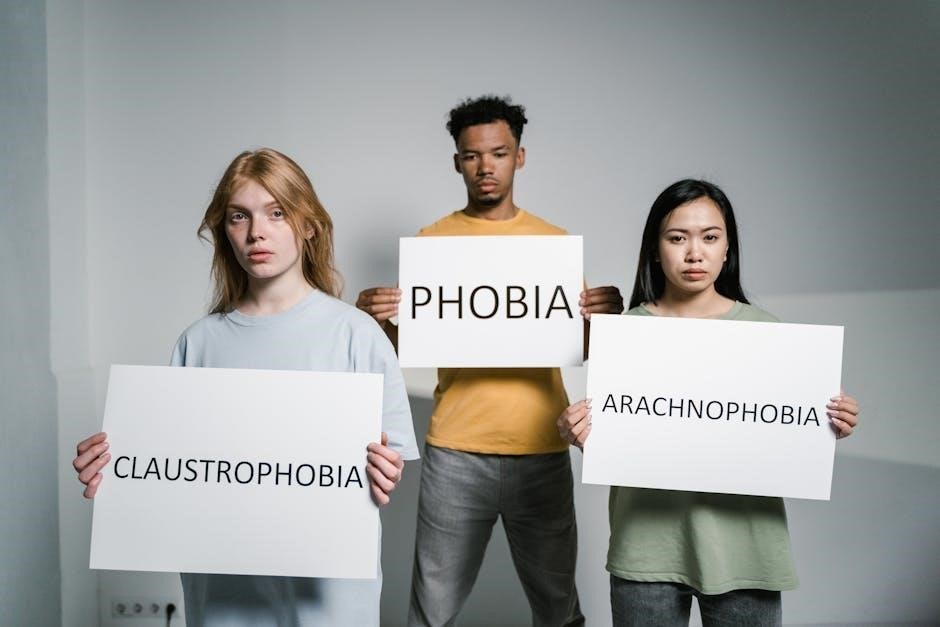The Liebowitz Social Anxiety Scale (LSAS) is a widely used 24-item instrument designed to assess fear and avoidance in social situations, aiding in diagnosing and managing social anxiety disorder․
1․1 Overview of the LSAS
The Liebowitz Social Anxiety Scale (LSAS) is a 24-item instrument assessing fear and avoidance in social situations․ It evaluates both performance and interaction scenarios, providing insights into the severity of social anxiety․ The scale includes two versions: a clinician-administered (LSAS-CA) and a self-report (LSAS-SR) format, ensuring flexibility in clinical and research settings․ Widely used globally, the LSAS has been validated in multiple languages and cultures, demonstrating strong reliability and validity․ Its versatility makes it a key tool in diagnosing and managing social anxiety disorder (SAD) across diverse populations․
1․2 Historical Background and Development
The Liebowitz Social Anxiety Scale (LSAS) was originally developed in the 1980s by Dr․ Michael R․ Liebowitz to assess social phobia comprehensively․ Initially called the Liebowitz Social Phobia Scale (LSPS), it was later refined into the LSAS in 2000 to better reflect the evolving understanding of social anxiety disorder (SAD)․ The scale has since become a gold standard in both clinical practice and research, widely adopted globally for its reliability and validity; Its development marked a significant advancement in the field, enabling accurate assessment of social anxiety symptoms and their impact on daily functioning․

Structure and Scoring of the Liebowitz Social Anxiety Scale
The LSAS is a 24-item scale assessing fear/avoidance in social situations․ Each item is rated 0-3, with total scores ranging from 0-72, indicating severity levels․
2․1 Subscales and Items
The LSAS consists of 24 items, each assessing fear and avoidance in specific social situations․ These items are divided into two subscales: social interaction and performance․ The social interaction subscale evaluates anxiety in situations like meeting new people or joining a conversation, while the performance subscale focuses on anxiety related to public speaking, eating in public, or writing in front of others․ Each item is rated on a 4-point Likert scale, from 0 (no fear) to 3 (severe fear), providing a comprehensive assessment of social anxiety severity․
2․2 Scoring Methodology and Interpretation
The LSAS is scored by summing the ratings of its 24 items, each ranging from 0 (no fear) to 3 (severe fear), resulting in a total score between 0 and 72․ Higher scores indicate greater social anxiety severity․ The scale is divided into two subscales: social interaction (11 items) and performance (13 items), each scored separately․ Clinical interpretation often categorizes scores as mild (0-30), moderate (30-50), severe (50-65), and extreme (≥65)․ This scoring system enables clinicians to assess symptom severity and monitor treatment progress effectively․

Psychometric Properties of the LSAS
The LSAS demonstrates strong psychometric properties, with high internal consistency and reliability․ It has been validated across diverse populations as a reliable measure of social anxiety severity․
3․1 Reliability and Internal Consistency
The LSAS exhibits strong internal consistency, with Cronbach’s alpha values ranging from 0․89 to 0․94, indicating high reliability․ Its consistent performance across diverse populations underscores its robustness as a clinical tool for assessing social anxiety severity․ This reliability ensures that the scale accurately captures both fear and avoidance dimensions, making it a dependable measure for both research and clinical settings․
3․2 Validity and Treatment Sensitivity
The LSAS demonstrates strong validity, effectively measuring social anxiety severity across various populations․ It is highly sensitive to treatment effects, making it a valuable tool for assessing therapeutic outcomes․ Studies show consistent correlations between LSAS scores and improvements in clinical trials, validating its use as a primary endpoint in research․ Its sensitivity to change ensures accurate monitoring of symptom reduction, further establishing its reliability in both clinical and research settings․

Clinical Applications of the LSAS
The LSAS is extensively used in clinical settings to diagnose and monitor social anxiety disorder, aiding therapists and clinicians in tailoring treatments and assessing progress effectively․
4․1 Use in Diagnosing Social Anxiety Disorder (SAD)
The LSAS is instrumental in diagnosing SAD by evaluating fear and avoidance across social and performance situations․ Clinicians use the scale to assess symptom severity, identifying patterns that align with DSM-5 criteria․ The 24-item structure allows for a comprehensive evaluation, distinguishing between different levels of anxiety and avoidance․ This tool helps in differentiating SAD from other anxiety disorders, ensuring accurate diagnoses and targeted interventions․ Its reliability and validity make it a cornerstone in clinical assessments for SAD․
4․2 Role in Clinical Trials and Research
The LSAS is widely used as a primary endpoint in clinical trials to evaluate the efficacy of treatments for social anxiety disorder․ Its sensitivity to change allows researchers to measure symptom improvement accurately․ In Phase 3 studies, the LSAS has been employed to assess the real-world effects of interventions like fasedienol; The scale’s reliability and validity make it a preferred tool for demonstrating treatment outcomes․ Its application in research ensures standardized evaluation, aiding in the development of evidence-based therapies for social anxiety․

Real-World Studies and FDA Feedback
The LSAS is integral in real-world studies assessing treatments like fasedienol․ FDA feedback highlights its role in Phase 3 trials as a primary endpoint, ensuring reliable outcomes documented in the LSAS PDF․
5․1 Use of LSAS in Phase 3 Clinical Studies
The LSAS has been employed as the primary efficacy endpoint in Phase 3 clinical studies evaluating treatments for social anxiety disorder, such as fasedienol․ Its structured format allows for precise measurement of symptom severity, facilitating robust data collection․ Additionally, the availability of the LSAS PDF ensures uniform administration across study sites, enhancing consistency and reliability․ This widespread use underscores its validity and sensitivity in capturing treatment effects, making it a cornerstone in clinical research․
5․2 FDA Feedback on Study Design
The FDA has provided positive feedback on study designs utilizing the LSAS as a primary endpoint, emphasizing its reliability and sensitivity in measuring treatment effects․ Researchers have incorporated this feedback to refine study protocols, ensuring alignment with regulatory expectations․ The FDA’s input has been instrumental in optimizing study designs, particularly in Phase 3 trials evaluating novel therapies like fasedienol․ This collaboration has enhanced the scientific rigor and clinical relevance of studies, ensuring patient-centric outcomes remain a focal point in treatment development․

Cross-Cultural and International Use
The LSAS has been successfully translated and validated for use in diverse cultures, including Latin American countries, Spain, Portugal, and Japan, ensuring its global applicability․
6․1 Translation and Validation in Latin American Countries
The LSAS has been translated and validated for use in Latin American countries, Spain, and Portugal․ Researchers collaborated to ensure cultural adaptation, maintaining the scale’s reliability and validity․ The self-report version (LSAS-SR) demonstrated excellent internal consistency across diverse populations․ Validation studies confirmed its effectiveness in assessing social anxiety disorder (SAD) in these regions․ This adaptation has facilitated cross-cultural research, enabling comparisons of social anxiety manifestations and treatment responses․ The successful translation underscores the LSAS’s global utility in mental health assessments․
6․2 Application in Japanese Populations
The Liebowitz Social Anxiety Scale has been effectively applied in Japanese populations, with studies conducted by institutions such as Tokyo Women’s Medical University; The clinician-administered version (LSAS-CA) is commonly used to assess social anxiety disorder (SAD) in Japan․ Cultural adaptations ensured the scale’s validity and reliability in this population․ The LSAS has been utilized in clinical trials and research to evaluate treatment efficacy for social anxiety in Japanese settings․ Its psychometric properties, including internal consistency, have been validated, making it a valuable tool for cross-cultural mental health assessments․
Self-Report vs․ Clinician-Administered Versions
The LSAS is available in self-report (LSAS-SR) and clinician-administered (LSAS-CA) versions, each offering unique advantages for assessing social anxiety․ The LSAS-SR allows individuals to independently evaluate their symptoms, while the LSAS-CA provides a clinician’s objective assessment, ensuring accuracy and depth in understanding social anxiety severity and treatment response․
7․1 LSAS-SR (Self-Report Version)
The LSAS-SR is a self-report version allowing individuals to independently assess their social anxiety symptoms․ It mirrors the clinician-administered version, covering 24 social interaction and performance scenarios․ Participants rate fear and avoidance on a Likert scale, making it accessible for large-scale studies and personal use․ Its reliability and validity have been established across diverse populations, including Latin American countries, Spain, and Portugal․ The LSAS-SR is often used in research and clinical settings due to its ease of administration and participant-reported insights․
7․2 LSAS-CA (Clinician-Administered Version)
The LSAS-CA is a clinician-administered version of the scale, requiring a trained professional to guide participants through the assessment․ It evaluates fear and avoidance across 24 social scenarios, ensuring accurate and consistent data collection․ Unlike the self-report version, the LSAS-CA allows clinicians to probe for clarifications, enhancing the reliability of responses․ This version is particularly valuable in clinical trials and research settings, where precise symptom measurement is critical․ Its administration ensures a standardized approach, making it a robust tool for diagnosing and monitoring social anxiety disorder․

Accessibility and Availability of the LSAS PDF
The LSAS PDF is accessible for download, offering a convenient tool for assessing social anxiety․ However, its use is subject to copyright restrictions․
8․1 Downloading the LSAS PDF
The LSAS PDF is readily available for download from various academic and clinical websites․ It is often provided as a free resource for researchers and clinicians․ To access the LSAS PDF, users can visit the official publisher’s website or reputable psychological assessment platforms․ Some versions may require registration or purchase due to copyright restrictions․ The PDF format allows easy distribution and use in clinical settings, making it a convenient tool for assessing social anxiety symptoms․ Always ensure compliance with copyright laws when using or sharing the LSAS PDF․
8․2 Copyright and Usage Rights
The Liebowitz Social Anxiety Scale is copyrighted, and its use is restricted under specific terms․ Clinicians and researchers must obtain proper licensing or permission to administer or distribute the scale․ The LSAS is available for clinical and research purposes, but reproduction or modification without authorization is prohibited․ Users must adhere to copyright laws and the publisher’s guidelines to ensure ethical and legal use․ For detailed information, refer to the official publisher’s website or contact the copyright holder directly․
The Liebowitz Social Anxiety Scale remains a cornerstone in assessing social anxiety, with global acceptance․ Future research should focus on enhancing its adaptability for diverse populations and integrating technology for improved accessibility and efficacy in clinical settings․
9․1 Summary of the LSAS Importance
The Liebowitz Social Anxiety Scale (LSAS) is a cornerstone instrument for assessing social anxiety disorder, widely recognized for its reliability and validity․ Its global acceptance stems from its ability to comprehensively evaluate fear and avoidance in social situations․ The scale’s adaptability across cultures and languages, including validated translations for Latin American and Japanese populations, underscores its versatility․ As a key tool in both clinical practice and research, the LSAS has significantly advanced the understanding and treatment of social anxiety, making it indispensable in mental health care․
9․2 Future Research and Improvements
Future research on the LSAS should focus on enhancing its cross-cultural validity and exploring its application in diverse populations․ Advances in digital health could enable online adaptations, improving accessibility․ Additionally, refining the scale to better capture subtle symptoms and individual differences may strengthen its utility․ Integration with emerging technologies, such as artificial intelligence, could further personalize assessments․ Continuous validation in clinical trials and real-world studies will ensure the LSAS remains a robust tool for advancing social anxiety disorder treatment and research globally․

Leave a Reply
You must be logged in to post a comment.